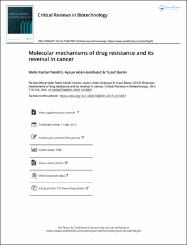Molecular mechanisms of drug resistance and its reversal in cancer
Abstract
Chemotherapy is the main strategy for the treatment of cancer. However, the main problem limiting the success of chemotherapy is the development of multidrug resistance. The resistance can be intrinsic or acquired. The resistance phenotype is associated with the tumor cells that gain a cross-resistance to a large range of drugs that are structurally and functionally different. Multidrug resistance arises via many unrelated mechanisms, such as overexpression of energy-dependent efflux proteins, decrease in uptake of the agents, increase or alteration in drug targets, modification of cell cycle checkpoints, inactivation of the agents, compartmentalization of the agents, inhibition of apoptosis and aberrant bioactive sphingolipid metabolism. Exact elucidation of resistance mechanisms and molecular and biochemical approaches to overcome multidrug resistance have been a major goal in cancer research. This review comprises the mechanisms guiding multidrug resistance in cancer chemotherapy and also touches on approaches for reversing the resistance.


















